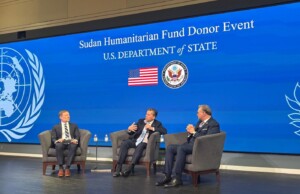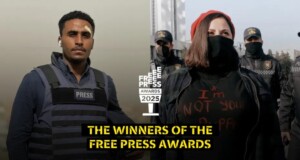Sudan security summons editor over JEM leader interview
The editor of El Baath weekly newspaper was summoned by security services in Khartoum on Monday and questioned about an interview with the head of the Justice and Equality Movement, Dr Jibril Ibrahim.
The editor of El Baath weekly newspaper was summoned by security services in Khartoum on Monday and questioned about an interview with the head of the Justice and Equality Movement, Dr Jibril Ibrahim.
El Baath editor Mahmoud Widaa said the security apparatus criticised the newspaper on carrying an interview with Ibrahim, on the grounds that “interviews with leaders of the armed movements is a ‘red line’ subject”.
Widaa said that the security officials told him that directives have been issued to the press not to hold any interviews with rebel leaders. He replied that “the newspaper is new and has only been operating for three months during which time it has not received any instructions not to have interviews with leaders of the armed movements”.
Media curbs
The Sudanese Journalists Network says that the Sudanese press is still facing real problems, most importantly by the state’s prior and pre-censorship of newspapers and violations of journalists' rights.
Speaking on the occasion of World Press Freedom Day on May 3 , the network confirmed the rise in the violations against the press in 2016 and predicted a rise during the last half of this year.
Hassan Barkiya, the member of the Journalists' Network told Radio Dabanga that the Sudanese press is facing real problems, including authoritarian interventions by the state and structural problems related to the press institutions themselves and the press industry.
He said that the press is working in an unfavourable legal and political environment that restricts press freedom, hinders the work of newspapers, and poses a threat to the press.
He explained that the real dilemma is the government’s interference with censorship including the confiscation of newspapers.
2017 World Press Freedom Index
Sudan ranks 174th out of 180 countries listed in the 2017 World Press Freedom Index compiled by Reporters Without Borders. The index notes: “Although indicted by the International Criminal Court for crimes against humanity, President Omar Al Bashir secured another term in an April 2016 election marked by harassment of the media, censorship, confiscation of newspaper issues, media closures, and Internet cuts.
The National Intelligence and Security Service (NISS) hounds journalists and censors the print media by closing-down newspapers such as Al Tayar, Al Jareeda and Al Watan, or by confiscating entire issues as they come off the press. The authority of the NISS was reinforced by a January 2015 amendment to the 2005 constitution granting it powers equivalent to those of the army.”











 and then
and then